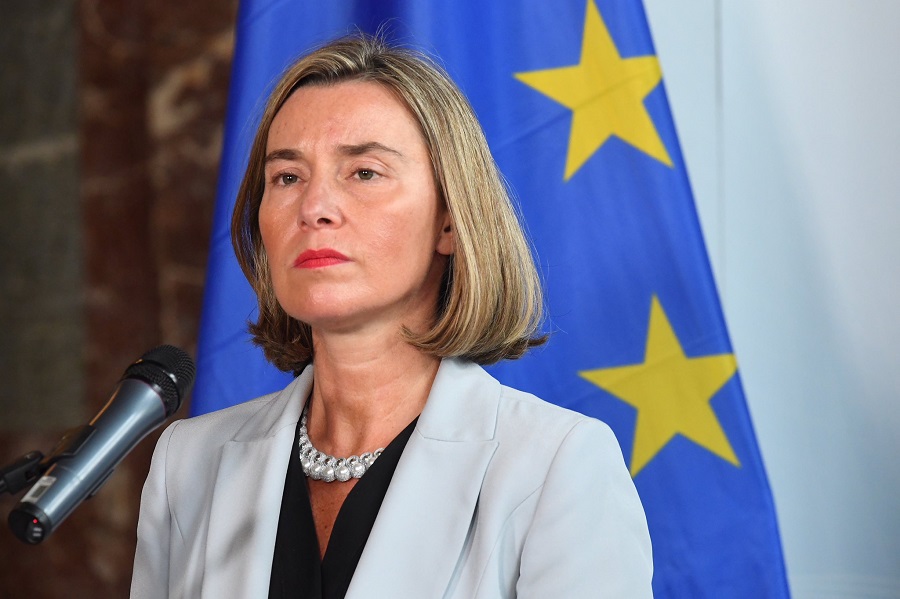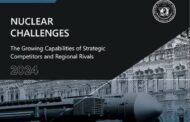Korean Security – the next steps
Speech by High Representative/Vice-President Federica Mogherini at Shangri-La Dialogue: Korean Security – the next steps
Singapore, 1 June 2019
____________________________________________________________________________________________________________________________________
Let me start by saying that it is always a pleasure to be in Singapore, to the Shangri-La dialogue, especially with the Defence ministers of two solid partners we have in the region as European Union: South Korea and Japan.
Let me start also with a personal memory – I first came to the Shangri-La Dialogue four years ago, in the first year of my mandate. And I came with one simple message: that Asia’s security matters to Europe. And we had the ambition to be not only – as we are already – the key economic partner for Asia, but also to become a global security provider or a security partner, and Asia should have been part of that work.
As we were starting to strengthening European Union credibility and capacity on the defence and security matters, I have to say that I have seen in our Asian partners constantly growing the interest in a closer and deeper cooperation with the European Union on security issues and I’m proud of that.
Four years on, we have come a long way on this. Today we work more closely than ever with ASEAN, not only politically and economically, but also on security including on the military level.
For the first time ever, we participated in a multinational naval exercise hosted by Indonesia. We have sent our security experts to many Asian countries, to increase our cooperation on a number of issues that are key both for Europe and Asia starting with counter-terrorism.
With eleven Asian countries, we engage directly on the military-to-military level. And we are now deploying military advisors in several of our European Union Delegations across Asia – starting with our Delegation to ASEAN in Jakarta.
In many cases, we are also deploying our militaries together on the ground. We have agreements with the Republic of Korea, with New Zealand, with Australia to facilitate their participation in European Union military and civilian missions around the world, and we are about to sign a similar arrangement with Vietnam.
In these very days, we have seen that Australia is about to contribute to the EU advisory mission in Iraq that is working hand in hand, in parallel with the new mission from NATO in the same country. We have been there as European Union with our advisors for one year and a half. And the Republic of Korea and New Zealand deployed respectively vessels, patrol aircrafts, and equipment as part of our European Operation
Atalanta, that is fighting effectively piracy off the coast of Somalia.
In the Strait of Aden – which links the Mediterranean to the Indian Ocean – it is clear that Europe and Asia have shared security interests that are also vital for our economic interests.
We need to work together. The world is becoming smaller and more connected, also more turbulent and compless. Confrontation too often prevails or seems to prevail over cooperation. I’m proud to say here that we, Europe and Asia, are the positive exception. In these years we have brought Europe and Asia closer, on security, on defence to promote peace on true spirit of cooperation and partnership.
I think that is a common achievement we manage to build in these years. I am proud, for instance, of the role European Union had in supporting peace negotiations in Myanmar and in the Philippines. And we have now put forward a five-point plan to accompany and facilitate peace talks in Afghanistan which I discuss in Kabul a couple of months ago with our partners.
This brings me to the issue we debate today – maybe the most pressing crisis in Asia from a security prospective and one of the last legacies of the Cold War as it was reminded.
In these years, we Europeans have always repeated three things on North Korea.
First, that lasting peace is possible, even if it looks unlikely. And some people called us idealistic for this.
Second, we have always said that the only solution is peaceful and diplomatic, not military. And sometimes we were called naïve for this. Third, we have always believed that the Korean peninsula needs a de-nuclearisation process that is complete, verifiable and irreversible. And some people told us that we lacked realism.
I believe today we have been proven right on all three things. First, peace is possible. Second, there is no military solution. And third, any agreement on the nuclear issue has to be ambitious and rock-solid.
Let me add that if such agreement looks possible even if still very difficult today, it is first and foremost thanks to President Moon. And I want to thank him for his leadership and courage. Without his leadership and courage I believe we wouldn’t be here today. And I am also glad that the US Administration has decided to engage, and to hold that historic summit here in Singapore one year ago.
Some have labelled the Hanoi summit as a failure, but in fact, I believe you can’t expect negotiations of this kind to be concluded smoothly in four months. It was probably even necessary to identify the issues where the US and North Korea are getting closer, and those where there is still lot of work to be done. Hanoi has proven that negotiations need to be built on a very solid foundation. And here I come to the way forward.
Moving forward requires first of all North Korea to accept to engage again, and to engage in good faith. And moving forward might also require on the way to be creative and explore new pathways towards de-nuclearisation and peace – building on the achievements of these years.
First of all, we know that the Inter-Korean talks and the US-North Korea talks are linked to one another. They both advance only if they advance in parallel. A group of facilitators might be useful to break the impasse, and to guarantee that any obstacle will not derail both processes.
Other powers have a stake in this process as it was mentioned and can also give a positive and important contribution – you have something to loose or something to gain and the process fails or succeed. Of course I refer to Japan, but also to China and Russia.
The European Union is ready to do his part. We have our own expertise in nuclear negotiations. We know how difficult also technically difficult they can be, and how to make negotiations more „resilient“ against shocks.
We know the importance of a strong monitoring and verification system – and we can help shape it. We could also put on the table of negotiations our financial support, both as leverage and as a contribution to „winning the peace“ if and when a deal is finally reached. And we can help address human rights issues, which are essential – let me remind it. We might be the last one attached to these principles but we still believe that human rights are essential elements to any normalisation and to any lasting peace.
And at the same time, we will keep putting pressure on North Korea. You all know that we have as European Union the toughest sanctions regime in place on North Korea, and we are working to make sure that all our partners also stick to their commitments with outreach to all our partners in the world with specific messages to some of them to make sure that the UN Security Council resolutions are implemented by all in full.
I believe in the power of a “critical engagement” with North Korea. As we have in place the tougher sanction regime in the world on North Korea, implementing the UNSC resolutions and adding our own European Union measures, let me stress sanctions are a means to a goal, and not a goal in themselves. And also sanctions will go but will go when a deal is reached and implemented.
All of us share the same goal. The question is: how can we best contribute to achieving it. I am convinced that the answer ultimately lies in a strong multilateral process. An inclusive process where all relevant actors can contribute. And an effective process, where both parties feel they have something to gain.
It might be necessary to give some security guarantees to North Korea: they should know that the goal is peace and de-nuclearisation, and nothing else.
I very much agree with President Moon, when he talks about a new regional security architecture for this part of the world. He has often mentioned the European Union as an example.
Of course every historical process has his specificity and it will never repeat itself in the shape. But there is always something to learn from others‘ experiences. And it will be important to bring our experience to the table.
We want to contribute to security and peace in Asia, starting with the work we have done in these years and concluding with the important work that has been done in the Korean Peninsula, because peace in Asia matters to Europe. So I am grateful for our cooperation in these years, and I am sure that Europe and Asia will be even closer and reliable partners in the years to come.
Thank you.
* * * * *
Zdroj: https://eeas.europa.eu/headquarters/headquarters-homepage/63535/speech-high-representativevice-president-federica-mogherini-shangri-la-dialogue-korean_en
Ilustračné foto: https://www.flickr.com/photos/eeas/41691210731/







